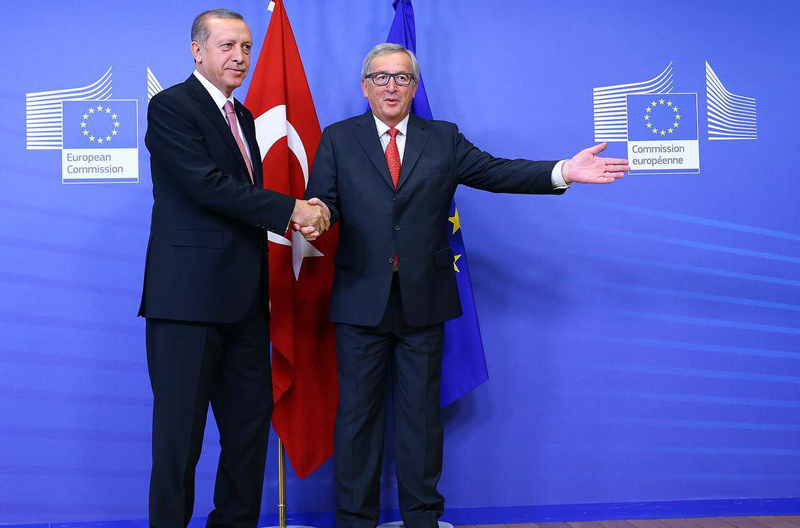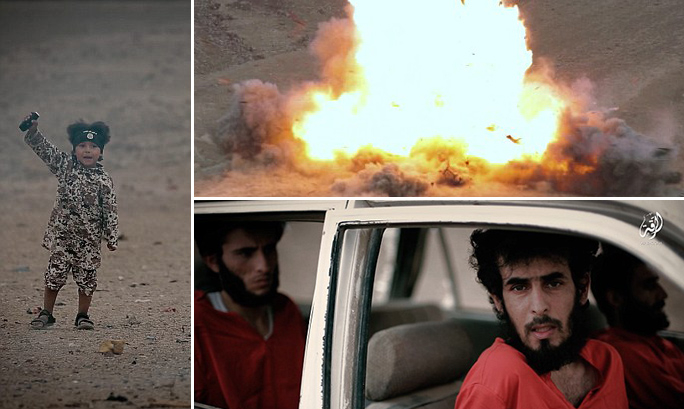Women have literally disappeared from cafés and bars in certain predominantly Muslim suburbs in France, according to recently aired undercover footage from the France 2 television channel. The footage featured two women activists, Nadia Remadna and Aziza Sayah, from the women’s rights campaign group, La Brigade des Mères (Brigade of Mothers), entering a café in the Paris suburb of Sevran, where they were met with surprise and hostility from the all-male customers. One told them: “It is best to wait outside. There are men in here… In this café, there is no diversity.”
Another customer told them: “In this café, there is no mixing. We are in Sevran, not Paris. Here there is a different mentality. It is like back home.”

Aziza Sayah (left) and Nadia Remadna (right) are activists from the “Brigade of Mothers” women’s rights group in France, who recently went with concealed cameras into a café in a Paris suburb, where they were met with surprise and hostility from the all-male customers. (Image source: France 2 video screenshot) |
In a suburb of Lyon, France 2 TV journalist Caroline Sinz spoke to a young woman who said that she is quite simply afraid to go out, and wears baggy clothes and no makeup to avoid being targeted by the Muslim men in the neighborhood.
In the words of Sinz, women seem “to have been erased,” from the cafés and the streets. Sinz goes on to explain that women in these areas used to protest against the status quo, but now,
“They are afraid, they have already spoken out in many cities, and were insulted and assaulted… So now to avoid threats, and being put under pressure, they censor themselves and keep quiet.”
Axelle Lemaire, France’s Minister for Digital Affairs, and the first government official to comment on the footage, said the footage appeared to show an “intolerable” and “illegal” case of “discrimination against women”. However, she was quick to add that it was not a question of religion, and said that France’s Muslim communities should not be blamed.
Lemaire’s comment about religion reveals, once more, the willful ignorance that so many in Europe’s political establishment display in their refusal to deal with the issues of Islamization. Sevran is part of the district of Seine-Saint-Denis, an area inhabited by over 600,000 Muslims, out of 1.4 million people. Already in 2011, a report by the highly respected political scientist and expert on Islam, Gilles Kepel, “Banlieue de la République” (“Suburb of the Republic”), showed that Seine-Saint-Denis, as well as other suburbs, were becoming parallel Islamic societies, increasingly cut off from the rest of French society. That women have now disappeared from the streets of Sevran cannot be divorced from the fact of the Islamization of these societies.
This Islamization has been fueled and strengthened by Qatar’s heavy investments — particularly in mosques — in France during the past five years. These investments currently stand at around $22 billion. Investments in mosques are how Qatar is apparently spreading Wahhabism/Salafism — a particularly radical form of Islam — around the world.
Islamic sharia law is quite clear on the role of the woman in Islam; French politicians might be well advised to open a Quran before they pronounce recent events as having “nothing to do with Islam.” The Quran states that a woman must obey her husband in all things [Quran 4:34][1] and that her role is in the home, where she should preferably stay, unless she has a legitimate errand to attend to outside the house [Quran 33:33].[2] In countries where sharia is the law of the land, as in Saudi Arabia, a woman cannot leave the home without permission of her husband.
Considering the subservient role of women in sharia law, it is only a natural development that those French suburbs that have become Islamized and where sharia is held in high regard, now resemble Saudi Arabia. The cumulative effects of Islamization, supported with Qatari money and influence, can come as a surprise only to those political and cultural elites who stubbornly refuse to acknowledge and deal with the realities.
Another French politician, former Labor Minister Eric Woerth, said that the footage “stabs at the heart of the Republic. The heart of the Republic is the equality between men and women”. But is this passionate declaration of “liberté, égalité, fraternité” not a bit belated? Where have these politicians been? A year ago, Pascale Boistard, then France’s Minister for Women’s Rights, said in an interview:
“There are areas in our territory where women are not accepted, where they are not respected, and where they are almost obliged to live with this fact as an annoyance in everyday life. And everyone seems to find it more or less normal… In many neighborhoods, women are limited to certain areas (the foyer, the exit from school …) and virtually absent from others, such as sports venues, or places of entertainment. Is it normal that in some places you cannot find any women in the cafes? There is a misplaced form of morality, often exercised by minority groups over a majority, which leads to the fact that the public space, supposedly belonging to both men and women, is restricted from women”.
The subordination, humiliation and terrorization of women in the suburbs has been going on for decades, right under the noses of those politicians who claim to care about women’s rights and “the heart of the republic,” yet chose to stay ignorant. In 2002, the late author of “Dans l’enfer des tournantes” (“To Hell and Back“), Samira Bellil, described how her life as a teenager in the late 1980s in the suburbs was, as the title suggests, pure hell. Speaking to Time magazine in 2002, she said: “From the moment a girl steps outside, guys think they have the right to pass judgment and treat us differently. In extreme cases, this leads to violence or aggression.” Bellil was gang-raped repeatedly by Muslim youths, who knew her and targeted her, because “any neighborhood girl who smokes, uses makeup or wears attractive clothes is a whore.” At the time, Time magazine further reported:
“[P]olice are loath to patrol the areas for fear of violence. The result: civility and order in many banlieues have broken down, and bands of young men feel they can attack women with impunity…”
This was fifteen years ago.
In the same article, Time also interviewed Fadela Amara, head of the organization, Ni Putes ni Soumise (“Neither Whores nor Submissives”) which campaigns for women to be able live normal, modern lives. Amara said that since 1992, women in the suburbs of France have had to deal with the spreading influence of Islamic fundamentalism:
“Over the past 10 years, the condition of women in the banlieues has radically deteriorated… We are seeing an increase in insults of young women who wear jeans, a rise in forced or arranged marriages, more young women obliged to drop out of school and a greater incidence of polygamy.”
Fifteen years later, French ministers feign surprise and outrage that women in these suburbs have finally succumbed to the incessant terror against them and are disappearing from the streets.
Judith Bergman is a writer, columnist, lawyer and political analyst.
[1] Quran 4:34: “Men are in charge of women by [right of] what Allah has given one over the other and what they spend [for maintenance] from their wealth. So righteous women are devoutly obedient, guarding in [the husband’s] absence what Allah would have them guard. But those [wives] from whom you fear arrogance – [first] advise them; [then if they persist], forsake them in bed; and [finally], strike them. But if they obey you [once more], seek no means against them.”
[2] Quran 33:33: “And abide in your houses and do not display yourselves as [was] the display of the former times of ignorance. And establish prayer and give zakah and obey Allah and His Messenger. Allah intends only to remove from you the impurity [of sin], O people of the [Prophet’s] household, and to purify you with [extensive] purification.”
































